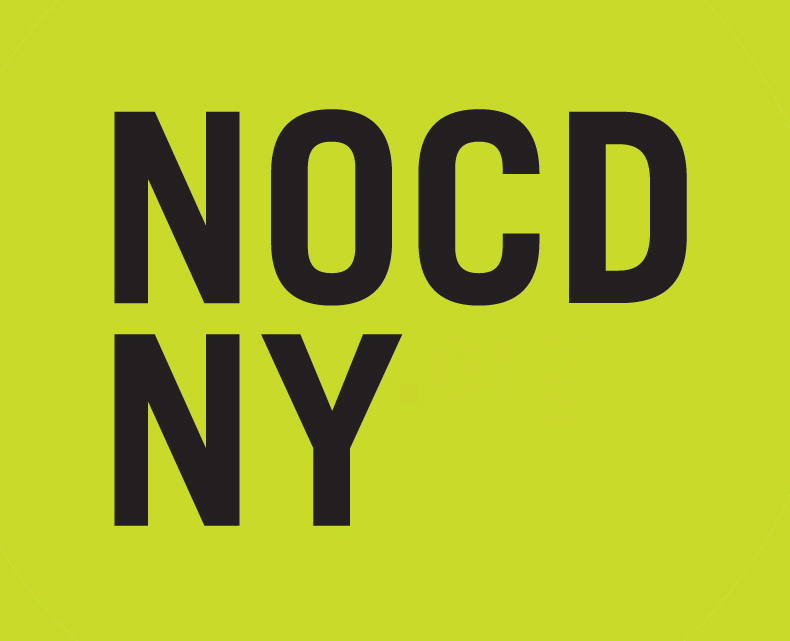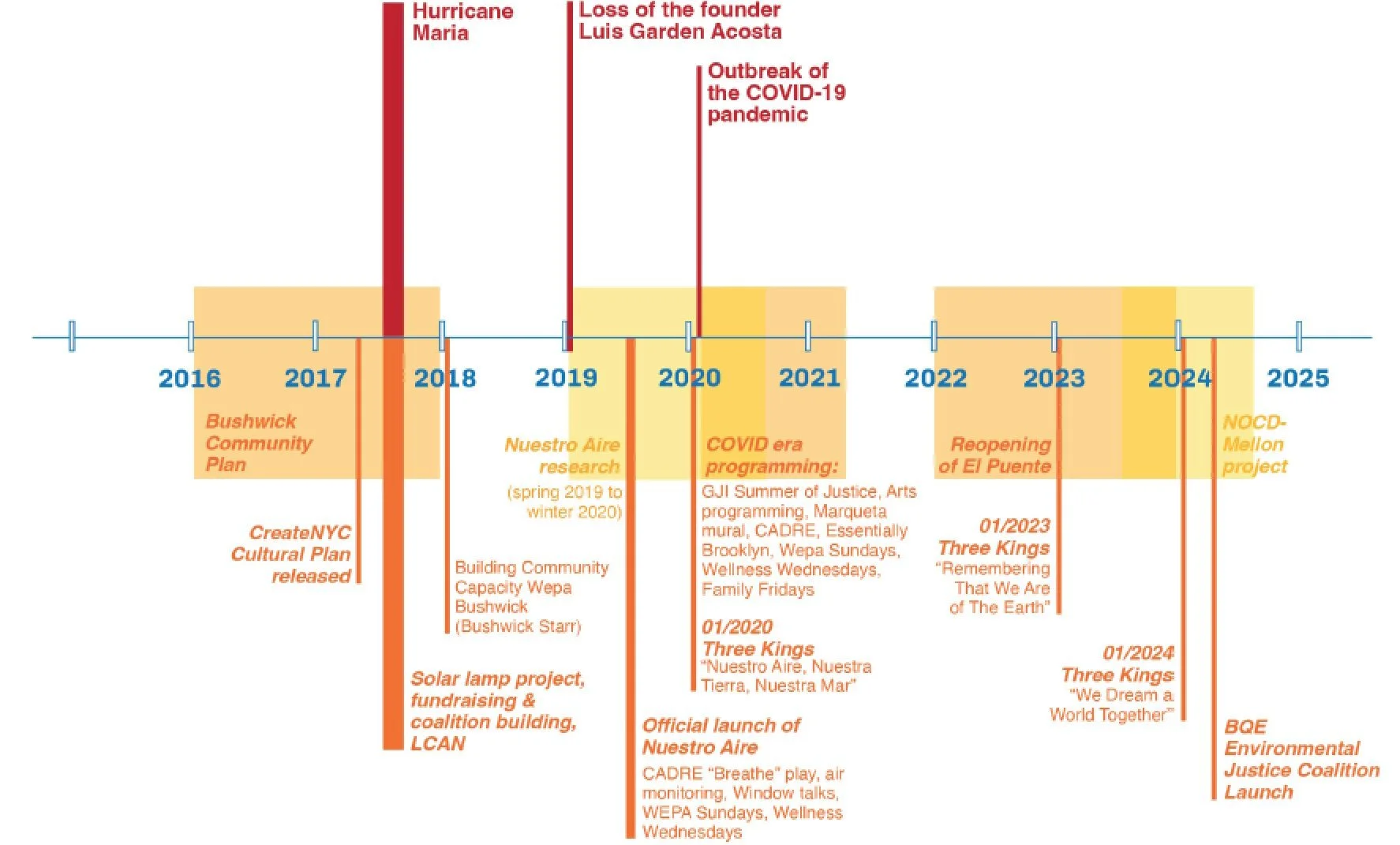El Puente: Meeting the Moment
For over forty years, El Puente has inspired and nurtured leadership for peace and justice in Los Sures and Bushwick, creating community-led movements of self determination using a holistic leadership and membership model. Using an “artivist” lens, it is at the forefront of cultural organizing, empowering youth and community, and supporting artists. As part of NOCD-NY’s Cultivating Neighborhood Networks project, they conducted participatory action research (PAR) to reflect on and evaluate priorities around supporting community and imagination during the pandemic/post-pandemic era. Excerpts of their Meeting the Moment: Creating and Sustaining Community through Continuity, Imagination and Honoring the Sacred report are featured below.
Grounded Practices
Timeline of El Puente’s past 10 years showing major events and projects
In the years leading up to the COVID-19 outbreak, El Puente developed and grounded practices that proved crucial during the pandemic. These practices were continuously affirming the North Brooklyn community’s right to imagine and reshaping the narratives to empower its collective agency.
Our Air! / ¡Nuestro Aire!
Poster for the ¡Nuestro Aire! campaign launch and event in July 2019
Project research reflected on recent and current initiatives, including their Our Air! / ¡Nuestro Aire! campaign, which collects community-led research on air toxicity in the neighborhood and high rates of asthma and respiratory disease to advocate for better health infrastructure. As the pandemic unfolded, El Puente leveraged pre-existing data to draw attention to at-risk residents and immediate actions and policy initiatives to tackle pollution.
Community Infrastructure for Preparedness
During the hardest months of the COVID-19 pandemic, El Puente emerged as vital community infrastructure, providing consistent support and services including: check-in calls with families, targeted services, educational resource and language navigation, school supplies and toys, culturally appropriate grocery delivery, wellness activity supplies, and human contact and emotional support, including for young people.
We had to become the connector. We did urgent and intense fundraising, to be able to address some of the dire and immediate needs that our families had. But it really came from listening to our families. Phone calls, wellness assessments that the centers were conducting with the families consistently… Because week to week, things were changing.”
- Asenhat Gomez, Deputy Director of Programs
The kind of mental and physical gymnastics that we had to do… that's all creativity. I think that was probably one of our most powerful, if not challenging moments. I think because we have as part of our culture and part of our practice, a deep sense of the sacred and deep practice of the spirit. I think that's what really got us through this moment and beyond.
- Dr. Frances Lucerna, Co-Founder
Cultural Connections
Los Muralistas de El Puente’s mural, Essentially Brooklyn
As schools went virtual and summer programs closed during the pandemic, El Puente staff and CADRE (community) artists continued to make physical and online connections in the community, including: Wellness Hub family needs assessment and community wellness programs, ¡WEPA! Live Music Sundays, Family Fridays artmaking, Grounding Mondays and Gratitutde Fridays for staff, Global Justice Institute’s “Summer of Justice”, and Los Muralistas de El Puente’s mural program.
Joe Matunis, leader of Los Muralistas, conceptualized Essentially Brooklyn, a project collaborating with youth and adult community artists to create around 80 portraits of essential workers. The nominations and stories of essential workers were gathered through a social media call. Joe would bike across the borough to distribute 2x2’ pieces of plywood for artists to compose portraits, then again to collect them. The result was a multi-panel mural, displayed in Domino Park for about a year.
Global Justice Institute
ALI Environmental Justice walking tour
El Puente practices and learnings are shared through their Global Justice Institute (GJI), a hub for training, development, and research. It codifies four decades of pedagogy and methodology of nurturing leaders for peace and justice. A powerful manifestation of GJI’s frameworks is expressed through the work of the Alumni Leadership Institute (ALI), which supports the leadership of young adults at El Puente and in their communities. ALI has designed and hosted Environmental Justice walking tours highlighting Southside history and ongoing efforts throughout the neighborhood.
Green Light District
Southside Summer Jam
El Puente’s Green Light District (GLD) initiative continues the Southside community’s right to self-determination and the realization of locally-led neighborhood visions for thriving and well-being. Much of this work is done through artistic expression, cultural organizing and education, with liberation models that recognize and honor the embodied knowledge, experiences and contributions of community members of all ages. This year, GLD’s “Southside Summer Jam” was a culmination of community science initiatives, oral history interviews, and collaborative art-making facilitated with youth participants.
Importance of Spaces
El Puente's spaces are living centers of action. Physical space and in-person presence carry significant value to the community as a way to connect. The absence of gathering spaces during the pandemic underscored their function as emotional anchors, where individuals and groups feel tethered, invested, and empowered to affect change together.
That is how community power is built—in shared space.
- Masoom Moitra, former Director of El Puente’s Green Light District
El Puente’s recommendations
As El Puente reflects on the pandemic era and evaluates priorities moving forward, recommendations include:
1. Reconnecting Art and Activism.
Investing in arts and cultural organizing means empowering artists as organizers who collaborate within communities, enhancing their capacity to become influential leaders.
2. Investing in Legacy Holders and Makers.
There’s a crucial role for nurturing and sustaining indigenous leadership, the ability to “grow your own” thought leaders who are deeply rooted in the organization's movement.





